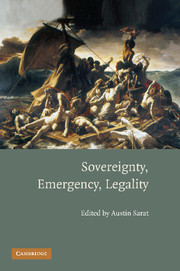Book contents
- Frontmatter
- Contents
- Contributors
- Acknowledgments
- Introduction: Toward New Conceptions of the Relationship of Law and Sovereignty under Conditions of Emergency
- 1 The “Organic Law” of Ex Parte Milligan
- Comment on Chapter 1: David Dyzenhaus, “The ‘Organic Law’ of Ex Parte Milligan”
- 2 Emergency, Legality, Sovereignty: Birmingham, 1963
- Comment on Chapter 2: “Order” in the Court
- 3 The Banality of Emergency: On the Time and Space of “Political Necessity”
- Comment on Chapter 3: Emergencies, Body Parts and Price Gouging
- 4 The Racial Sovereign
- Comment on Chapter 4: Toward a Nonracial Sovereign
- 5 Should Constitutional Democracies Redefine Emergencies and the Legal Regimes Suitable for Them?
- Comment on Chapter 5
- Index
Comment on Chapter 5
Published online by Cambridge University Press: 07 May 2010
- Frontmatter
- Contents
- Contributors
- Acknowledgments
- Introduction: Toward New Conceptions of the Relationship of Law and Sovereignty under Conditions of Emergency
- 1 The “Organic Law” of Ex Parte Milligan
- Comment on Chapter 1: David Dyzenhaus, “The ‘Organic Law’ of Ex Parte Milligan”
- 2 Emergency, Legality, Sovereignty: Birmingham, 1963
- Comment on Chapter 2: “Order” in the Court
- 3 The Banality of Emergency: On the Time and Space of “Political Necessity”
- Comment on Chapter 3: Emergencies, Body Parts and Price Gouging
- 4 The Racial Sovereign
- Comment on Chapter 4: Toward a Nonracial Sovereign
- 5 Should Constitutional Democracies Redefine Emergencies and the Legal Regimes Suitable for Them?
- Comment on Chapter 5
- Index
Summary
“Things fall apart; the centre cannot hold.”
Introduction
Yeats' Second Coming is the classic statement of anxiety in the midst of stressful times. To him, the unsettling event was the seeming collapse of Western Civilization after World War I and the uncertainty of what would follow. Nearly a century has passed since Yeats' “rough beast” slouched toward Bethlehem to be born and little has changed. The old certainties have vanished while the twenty-first century witnesses clashes among peoples who are startlingly different from each other. Sometimes the differences are irreconcilable. Sometimes they lead to violent clashes or social disintegration. Usually they inject insecurity into our lives. Michel Rosenfeld's contribution to this symposium poses the question of how societies should manage the fact of diversity while reacting to threats – internal and external, real and perceived. His solution is to recognize a condition of “stressful times,” located between ordinary times and crisis, where the sovereign's reactions are restrained by the need to protect the pluralistic character of the polity. While his proposal is sound in many respects, I believe that in many cases liberalism will yield the same results; Rosenfeld's scheme, moreover, underestimates the positive role that assimilation can play in a diverse society that is under stress.
Rosenfeld argues that a modern constitutional democracy must develop appropriate political rights and institutions to protect its constituents, who collectively hold a welter of comprehensive philosophies and identities. By political rights, he means those rights that are necessary or indispensable for citizens to run their polity or receive its benefits.
- Type
- Chapter
- Information
- Sovereignty, Emergency, Legality , pp. 273 - 288Publisher: Cambridge University PressPrint publication year: 2010



